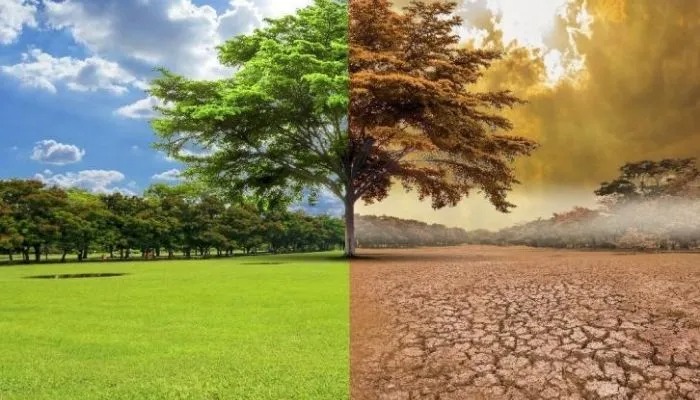Climate change and its impact on nutrition
World Ozone Day 16th September, 2023
Climate change is no longer a distant concern, it is an immediate and global threat of significant implication for global health and well–being. It poses grievous social, environmental, economic, and nutritional significance to regions around the world.
While its most visible consequences include extreme weather events and rising sea levels, there is a quieter, but equally drastic consequence: its impact on nutrition. Climate change is disrupting food systems, altering the availability and nutritional content of our food, and presenting serious challenges to global health.
It threatens the ability to meet the Sustainable Development Goal of Zero Poverty (SDG 1), Zero Hunger (SDG 2), and Good Health and Well-being (SDG 3) by 2030. The interconnectedness of climate change with these critical goals underscores the need for coordinated efforts at a global and local levels to mitigate its effects and promote resilience and sustainability.
As we commemorate World Ozone Day, it is essential to acknowledge the progress made by individuals, organizations, and governments in preserving the Earth’s Ozone layer and raise awareness about the profound impact of climate change on the nutritional well-being of vulnerable populations in developing countries.

Preserving the Ozone layer is of utmost importance as it plays a crucial role in safeguarding life on earth by absorbing and blocking a significant portion of the sun’s harmful ultraviolet (UV) radiation. Although greatly impacted by human activities, ozone depletion has an adverse effect on ecosystems including harm to marine life, disruptions to the food system, and threats to human health. In fact, it poses a substantial risk to the foundation of the pillar of global food security, according to the World Bank about 80% of the global population most at risk from crop failures and hunger from climate change are in Sub-Saharan Africa, South Asia, and Southeast Asia, where farming families are disproportionally poor and vulnerable.
Climate Change and Its Impact on National Food Security
Quality Food is a basic component of good nutrition: The quality of food that individuals consume significantly influences their overall quality of life and health. This underscores the importance of giving utmost attention to climate change.
The initial stage of the food supply system, which is food production, is currently undergoing significant disruption due to extreme climate change. Reduced productivity resulting from these climate change conditions has led to food shortages, interruptions in the food supply chain, and an increase in food prices, further exposing vulnerable groups to the scourge of hunger and poverty.
Without solutions, an additional 43 million people in Africa alone could fall below the poverty line by 2030 as a result.
Recently, Nigeria declared a state of food insecurity due to the severe impacts of climate change on agriculture amongst several other factors. Research has shown that climate variability and change are projected to lead to a continued incremental decrease in the production of major staple crops, including maize, rice, peanuts, yam, vegetables, sorghum, and millet across African countries.
Nigeria like other African Food–production countries, heavily relies on rainfall and natural resources for 80% of its food production. However, in recent times, there has been a growing concern about the abnormal onset and cessation of rainfall, depletion of natural resources, extreme droughts and desertification in the northern states, excessive precipitation, combined with major floods and erosion issues of farmlands, rising temperatures, increasing aridity, and soil acidity in the Sudan and Sahel savannah belts, changes in relative humidity, increased evaporation have negative consequences on agricultural activities and food systems. This alteration has led to disruption in the seasonal pattern of food production and distribution, thereby, creating limited access to food across the nation due to unpredictable climate variability and change.
Precisely, rain-fed crop yields are projected to decrease by nearly 50% due to climate variability and change, making it significantly more challenging to achieve food stability.
In order to re-enforce the nexus between agricultural productivity and the four dimensions of food security – food availability, accessibility, stability, and food utilization – collective effort is required at the local, national, and global levels.
The consequence of altered food systems caused by climate change
Nutritional Quality of Food
Approximately 76% of the world’s population derives most of its daily nutrients from food. Beyond just reducing crop yields, climate change also has detrimental effects on the nutritional quality of the food we grow. Elevated levels of Carbon dioxide (CO2), the primary greenhouse gas emitted into the atmosphere can result in a phenomenon known as “carbon nutrient dilution.” This implies that crops like wheat, rice, and soybeans contain fewer essential nutrients like zinc and iron when grown in high CO2 environments This not only poses challenges in feeding the world’s population but also exacerbates the problem of micronutrient deficiency.
Research conducted by Sam Myers, Director of the Planetary Health Alliance at the Harvard Chan School, has uncovered that when food crops like wheat, corn, rice, and soy are exposed to CO2 at high levels predicted for 2050, the plants lose as much as 10% of their zinc, 5% of their iron, and 8% of their protein content. These reductions pose substantial health risks, particularly in developing nations where deficiencies in these nutrients are associated with a wide range of diseases, from maternal mortality during childbirth to developmental issues in children.
Additionally, extreme weather events have the potential to disrupt the food supply chain, leading to spoilage and loss of nutrient-rich foods. For example, flooding can contaminate water sources and damage infrastructure, rendering the storage and transportation of perishable goods impossible.
Impact on Livestock and Fisheries
Climate change does not solely affect crops; it also has significant effects on livestock and fisheries which are vital sources of protein for many communities. Rising temperatures and shifting weather patterns can lead to stress in, livestock, reduce their productivity, and make them more susceptible to diseases. Similarly, the warming of oceans can disrupt marine ecosystems, affecting the availability, loss of biodiversity, and distribution of fish species.
Human Health and Nutrition
The consequences of climate change on nutrition extend to human health. Malnutrition, in its various forms – undernutrition, overnutrition, and micronutrient deficiencies – can all be exacerbated by climate change. Food insecurity, coupled with changing food quality and hiked prices, can lead to undernutrition and stunted growth, particularly in children. On the other hand, climate-related disasters like hurricanes and floods can disrupt food access to fruits, vegetables, and animal-sourced foods. The effect is an increase in the consumption of calorie-dense and nutrient-poor foods, contributing to malnutrition and non-communicable diseases.
Adaptation and Mitigation
Addressing the impact of climate change on nutrition requires a multifaceted approach. Mitigation efforts, such as reducing greenhouse gas emissions and transitioning to sustainable agricultural practices, are essential to slow down climate change’s progression. Simultaneously, adaptation measures are crucial to help communities cope with specific challenges.
Adaptation strategies include improving crop resilience to climate stress, promoting diversified diets, afforestation, strengthening food storage and distribution systems, consumption of diversified diets, and enhancing the nutritional content of crops through breeding and agricultural techniques.
Recommendations
Practical recommendations include:
- Access to climate information: Early warning detection systems should be developed to disseminate climate-related information, helping farmers, communities, governments, and humanitarian organizations prepare for and respond to climate-related disasters. This proactive approach can significantly reduce the human and economic toll of such events and enable informed decision-making to adapt to rapidly changing climatic conditions.
2. Policy Advocacy: Lobby for climate policies that prioritize vulnerable groups by promoting equitable access to resources, disaster preparedness, and adaptation strategies. Comprehensive collaboration among the government, civil society and international organizations should prioritize climate-resistant agriculture and nutrition programs to address both the immediate impacts and long-term challenges of a changing climate. Policies that promote sustainable agriculture, climate resilience and conservation should be implemented and enforced.
3. Capacity Building: Empower vulnerable communities with knowledge and skills to adapt to climate change. This includes education on sustainable farming practices, disaster preparedness, and renewable energy technologies. Support community-based initiatives that strengthen resilience, such as building climate-resistant infrastructure and improving access to healthcare. Government and organizations should encourage climate smart agriculture by creating subsidies for resilient crop varieties or access to credit for small scale farmers.
4. Climate Smart Agriculture practices: Implement Climate-Smart Agriculture, integrating diverse and nutrient-rich crops, climate resilience, water and sustainable land resource management, and community-based adaptation, to address climate change challenges while improving nutrition and food security tailored to local community needs.
Conclusion
Climate change is a complex, interrelated issue with far-reaching consequences for nutrition and global health. As temperatures continue to rise and extreme weather events become more frequent, it is imperative that we prioritize efforts to mitigate and adapt to these changes. This includes not only reducing our carbon footprint but also investing in sustainable agriculture, resilient food systems, and innovative solutions to ensure that all people have access to nutritious and safe food, regardless of the challenges posed by a changing climate. The time to act is now, for the sake of our planet and our collective well-being.
Authors
ADETULA, Oluwole
OJO, Ayooluwa
OLADIPO, David
OLAFIOYE, Precious
OYEDELE, Rilwan
The authors are dedicated nutrition and health experts pursuing a master’s degree in the Department of Human Nutrition and Dietetics at the University of Ibadan, Nigeria. With their extensive academic backgrounds and a range of professional experiences, they aim to make meaningful contributions to addressing critical nutrition concerns, even at the most localized levels




